Plastic Reduction and Your Route to Net Zero
Plastic reduction is an effective carbon reduction strategy and focuses on prevention, reduction, and reusability.
Achieve Your Facility’s Net Zero Objectives
Drive carbon reductions and your route to net zero through:
- Reduce Reliance on Single-Use Plastics
- Moving Waste Up The Waste Hierarchy
- Implementing Reusable Systems
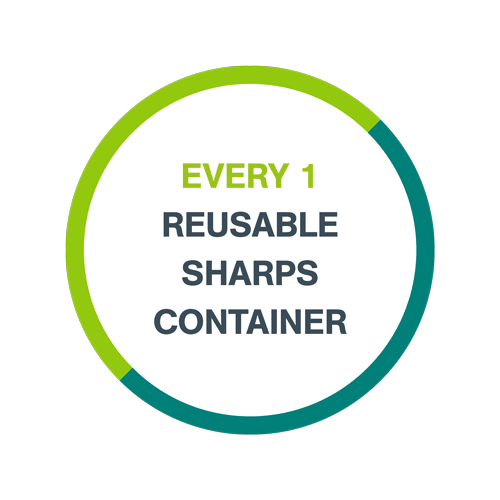 A Strategy for a Greener Future in Healthcare
A Strategy for a Greener Future in Healthcare
Are you looking for strategies to reduce your organisation’s carbon footprint?
Plastic reduction is an effective strategy – it involves choosing reusable products over single-use disposables whenever possible, moving waste up the waste hierarchy by focusing on prevention, reduction, and reusability.
But how can you implement a successful plastic reduction strategy?
Here are some tips:
- Conduct a thorough audit of all the plastic waste you’re currently generating.
- Follow sustainable procurement frameworks when purchasing products or services.
- Work towards recycling, reducing packaging, and avoiding single-use plastics.
By embracing plastic reduction practices, you’ll contribute to a healthier, greener future for us all. So why wait?
Get in touch for help navigating your route to Net Zero and making the most of plastic reduction strategies today!
-

MOVE WASTE UP THE HIERARCHY
Reduce your reliance on single-use plastics and eliminate tonnes of plastic from the waste stream – moving waste into more favourable positions in the waste hierarchy.
-

BESPOKE SOLUTIONS
A full site-wide audit is essential for understanding the specific needs and requirements of your facility and teams before rolling out any solutions.
-

MINIMISE SINGLE-USE PLASTIC
Reusable solutions enable you to eliminate tonnes of plastic from manufacturing and incineration, as well as reduce carbon footprint throughout the product life cycle.
Reusable Sharps Containers – An Example of Plastic Reduction
It’s no big secret that for decades, reusable sharps containers have been a quick-win solution to reduce single-use plastics in the healthcare environment, and as a result, significantly reduce the associated greenhouse gas emissions.
Another key advantage of reusable containers is that they reduce CO2 throughout their entire life cycle.
The “Impact on Life-Cycle Carbon Footprint” study demonstrated that annually for every 100 beds you could:
- Reduce your carbon footprint by 11.2 tonnes of CO₂e.
- Eliminate incineration of 3.1 tonnes of plastic.
- Eliminate the use of 0.5 tonnes of cardboard.
- Eliminate the manufacture 5,837 single-use sharps containers.
- Save 153 hours in exchanging full sharps containers.
Explore Our Net Zero Resources
-

The Hidden Cost of Plastic in Healthcare
This guest blog by Richard Hixson exposes the environmental impact of plastic in hospitals.
Read More -

Aligning with the Net Zero Supplier Framework
Aligning with the NHS Net Zero Supplier Framework is crucial for a greener healthcare.
Read More -

Navigating ERIC Data Reporting – Tips for NHS Healthcare Workers
Learn about navigating ERIC data reporting with a full understanding.
Read More -
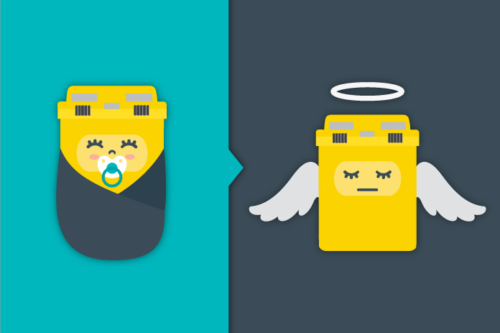
The Life Journey of Our Reusable Sharps Containers
Where do reusable sharps containers come from?
Read More -

Expert Tips for Hospitals on the Route to Net Zero
The route to Net Zero is paved with green intentions… or something like that.
Read More -
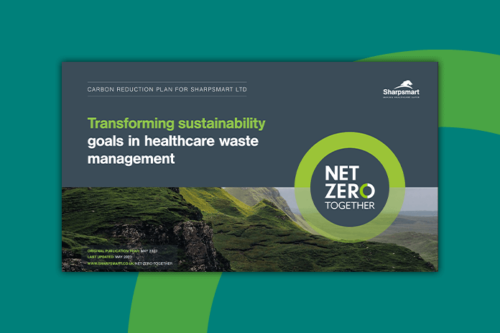
Our Carbon Reduction Plan
Explore our strategies and commitments to reaching Net Zero by 2040.
View Our Plan -
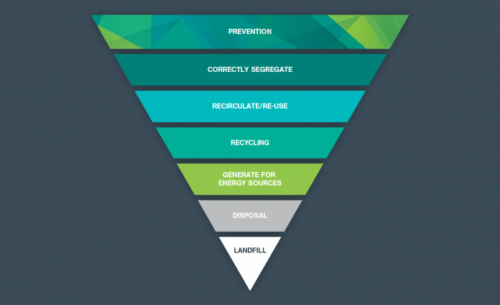
What is the Waste Hierarchy?
Explore some helpful steps for implementing the waste hierarchy that can be used for healthcare facilities of any size.
Explore -
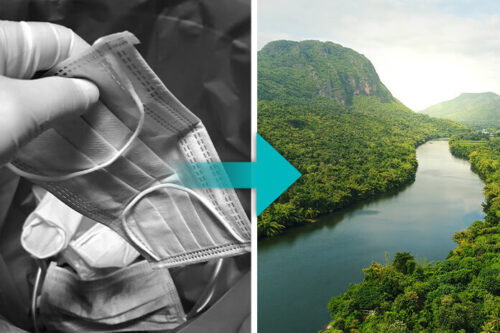
How Offensive Waste Drives Sustainability
Utilising the offensive waste stream has been proven to drive sustainability in healthcare and significantly reduce carbon footprint
Read More -
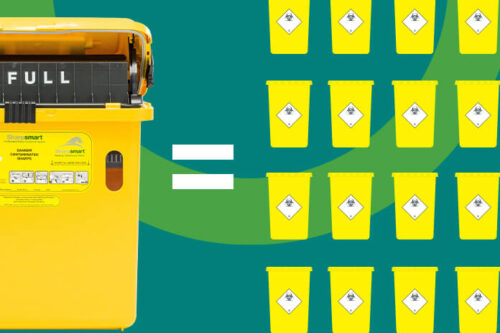
A Method for Reducing Single-Use Plastics
Learn more about the role of reusable sharps containers in reducing single-use plastics in the NHS.
Learn More -

5 Ways to Reduce Your Carbon Footprint Within Waste Management
Healthcare facilities are looking for additional ways to drive positive change and introduce more sustainable practices.
Explore -
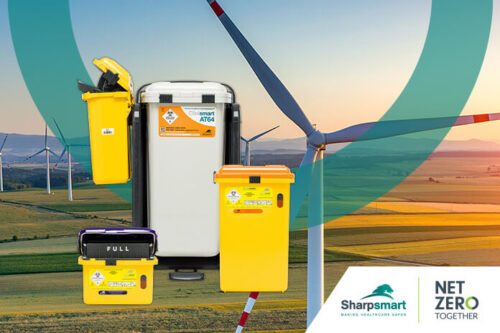
What is Greener NHS?
The NHS has made a commitment to becoming a greener organisation and is the first national health service to commit to net zero.
Learn More -
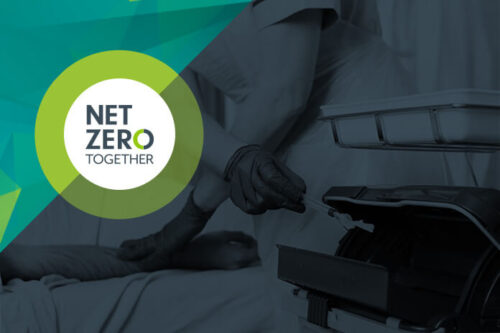
Our Commitment to Sustainability
We’ve developed our own route to net zero strategy, committed to achieving net zero emissions by 2040.
Find Out More -

Our Sustainability
Through superior technology, reusable clinical waste containers and recycling initiatives, our sharps and clinical waste solutions minimise CO2 burden.
Learn More -

Sustainable Operations
Sharpsmart’s green commitments far surpass its reusable containment systems and robotic washing technology, learn more.
Find Out More -

Metal Recycling Solutions
Sharpsmart’s metal waste recycling offering is specifically designed to reduce carbon footprint in theatres and surgical areas.
Learn More -

Case Study: Peterborough & Stamford
Two UK Healthcare facilities were able to drastically reduce their CO2 production and sharps waste volumes by switching to a reusable sharps container.
Read More -
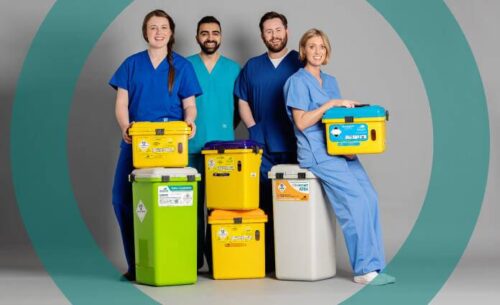
Case Study: Royal Free
Royal Free Trust was able to reduce their CO2 emissions by over 150 tones and reduce sharps waste volume by over 25 tonnes – all by partnering with Sharpsmart.
Find Out More -

Case Study: Liverpool Women’s
The Trust was in need of a more sustainable sharps management program that impacted their CO2 emissions and environmental footprint
Read More -
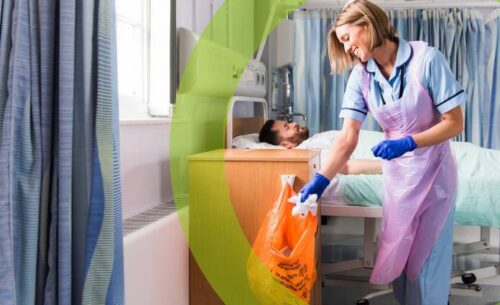
Clinical Waste Optimisation
Introduce new waste streams and divert waste from carbon intensive outlets with the bag-to-bed system.
Explore More -
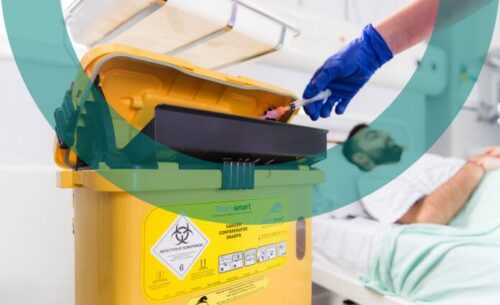
Resource: Life Cycle Carbon Footprint
The article compares the global warming potential (GWP) of 40 acute NHS Trust hospitals converting from single-use to reusable sharps containers.
Download -

Green Apple Environment Awards
Explore our partner’s success at the annual ‘Green Apple Environment Awards’, an international campaign designed to recognise environmental best practice.
Find Out More -
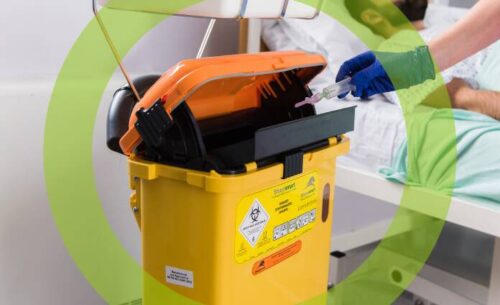
PR Study: Impact on Life Cycle Carbon Footprint
This study published in the British Medical Journal Open is an before/after intervention study to determine impact on life-cycle carbon footprint of sharps containers in 40 NHS trusts.
Read More -
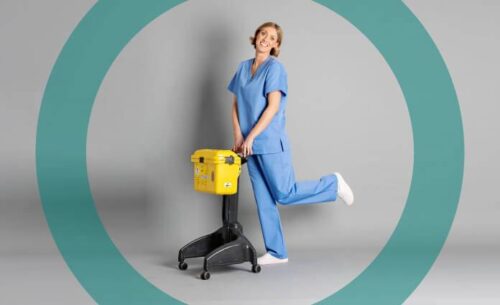
Disposable vs Reusables
Learn more about reusable containers and how they improve safety in your facility and reduce your environmental impact.
Learn More -

Exploring Environmental Impacts
Exploring the environmental impact of reusable vs. single-use sharps containers
Take A Look -

Excellence in Supply Awards
Sharpsmart Ltd recognised for sustainability credentials at NHS in the Midlands, excellence in supply awards.
Find Out More -
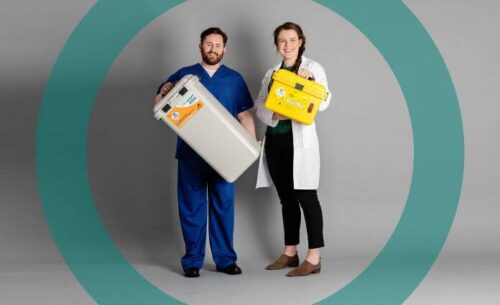
NHS Green Apple Success
NHS Trusts celebrate the success of their sustainability initiatives with the help of Sharpsmarts’ reusable sharps container system.
Take A Look
The Reduced Plastic Approach to Net Zero
Plastic reduction strategies such as reusable solutions are an effective way to reduce environmental impact with minimal staff behavioural change – helping healthcare facilities reach Net Zero.
We work with teams within the four walls of the healthcare environment to implement safe reusable solutions that steer them away from a heavy reliance on single-use plastics.
We’re here to help you navigate Net Zero.
Let's Talk!
Your time is valuable, and we don’t want to play hard to get. You can either phone us directly on the details listed on our contact page, or feel free to fill out this short form and one of our team members will get back to you as quickly as possible.